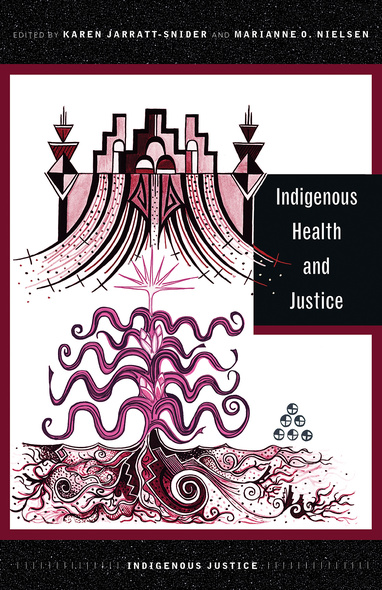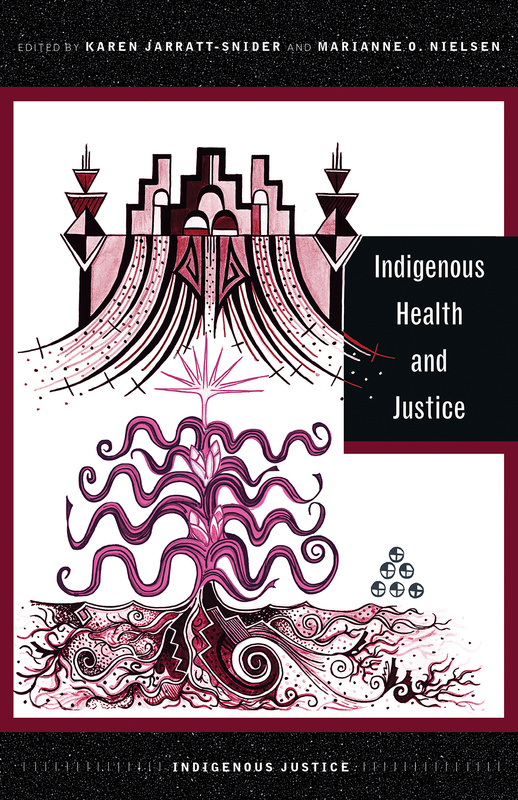
264 pages, 5 1/2 x 8 1/2
5 b&w illustrations, 4 tables
Paperback
Release Date:04 Jun 2024
ISBN:9780816553167
Indigenous Health and Justice
Edited by Karen Jarratt-Snider and Marianne O. Nielsen
SERIES:
Indigenous Justice
The University of Arizona Press
Colonial oppression, systemic racism, discrimination, and poor access to a wide range of resources detract from Indigenous health and contribute to continuing health inequities and injustices. These factors have led to structural inadequacies that contribute to circular challenges such as chronic underfunding, understaffing, and culturally insensitive health-care provision. Nevertheless, Indigenous Peoples are working actively to end such legacies.
In Indigenous Health and Justice contributors demonstrate how Indigenous Peoples, individuals, and communities create their own solutions. Chapters focus on both the challenges created by the legacy of settler colonialism and the solutions, strengths, and resilience of Indigenous Peoples and communities in responding to these challenges. It introduces a range of examples, such as the ways in which communities use traditional knowledge and foodways to address health disparities.
Indigenous Health and Justice is the fifth volume in the Indigenous Justice series. The series editors have focused on different aspects of the many kinds of justice that affect Indigenous Peoples. This volume is for students, scholars, activists, policymakers, and health-care professionals interested in health and well-being.
In Indigenous Health and Justice contributors demonstrate how Indigenous Peoples, individuals, and communities create their own solutions. Chapters focus on both the challenges created by the legacy of settler colonialism and the solutions, strengths, and resilience of Indigenous Peoples and communities in responding to these challenges. It introduces a range of examples, such as the ways in which communities use traditional knowledge and foodways to address health disparities.
Indigenous Health and Justice is the fifth volume in the Indigenous Justice series. The series editors have focused on different aspects of the many kinds of justice that affect Indigenous Peoples. This volume is for students, scholars, activists, policymakers, and health-care professionals interested in health and well-being.
To stay alive in modern America, most Indigenous people depend on Western medicine. This book reveals the truth and describes the survivance of Native people during the Covid years while telling us about the early problematic history of government Indian health care.’—Donald L. Fixico, author of The Urban Indian Experience in America
Karen Jarratt-Snider (Chocktaw descent) is a professor in the Department of Applied Indigenous Studies at Northern Arizona University.
Marianne O. Nielsen is a professor emerita in the Department of Criminology and Criminal Justice at Northern Arizona University.
Acknowledgments
Introduction
Marianne O. Nielsen and Karen Jarratt-Snider
PART I. HEALTH DISPARITIES IN INDIGENOUS COMMUNITIES
1. Indigenous Peoples’ Involvement in the U.S. Justice System, Trends, Health Impacts, and Health Disparities
Ricky Camplain, Carmenlita Chief, Carolyn Camplain, Nicolette I. Teufel-Shone, and Julie Baldwin
2. The Historical Failure of the Indian Health Service and the Restoration of Health-Care Sovereignty
Joseph Dietrich and Jean Reith Schroedel
3. The Pursuit of Wellness and Decolonization Through Centering Stories of Post-9/11 Native Veterans
Leola Tsinnajinnie Paquin
PART II. COVID-19 IMPACTS
4. Indigenous Nation Rebuilding: Pandemic-Tested Sovereignty, Health, and Resilience
Manley A. Begay Jr., April D. J. Petillo, and Carol Goldtooth
5. The Navajo Nation Response During the Early Stages of the COVID-19 Pandemic
Miranda Jensen Haskie
6. Media Framing of the COVID-19 Pandemic Across Native Nations
Stefanie Kunze and Earlene Camarillo
PART III. COMMUNITY RESPONSES AND RESILIENCE
7. Remaking Place: Diné Land, Health, and Wellness
Kerry F. Thompson and Ora V. Marek-Martinez
8. Restoring Mana: How One Māori Agency Is Addressing Domestic Violence
Kanoelani R. Dodd and Marianne O. Nielsen
Conclusion
Karen Jarratt-Snider and Marianne O. Nielsen
Contributors
Index
Introduction
Marianne O. Nielsen and Karen Jarratt-Snider
PART I. HEALTH DISPARITIES IN INDIGENOUS COMMUNITIES
1. Indigenous Peoples’ Involvement in the U.S. Justice System, Trends, Health Impacts, and Health Disparities
Ricky Camplain, Carmenlita Chief, Carolyn Camplain, Nicolette I. Teufel-Shone, and Julie Baldwin
2. The Historical Failure of the Indian Health Service and the Restoration of Health-Care Sovereignty
Joseph Dietrich and Jean Reith Schroedel
3. The Pursuit of Wellness and Decolonization Through Centering Stories of Post-9/11 Native Veterans
Leola Tsinnajinnie Paquin
PART II. COVID-19 IMPACTS
4. Indigenous Nation Rebuilding: Pandemic-Tested Sovereignty, Health, and Resilience
Manley A. Begay Jr., April D. J. Petillo, and Carol Goldtooth
5. The Navajo Nation Response During the Early Stages of the COVID-19 Pandemic
Miranda Jensen Haskie
6. Media Framing of the COVID-19 Pandemic Across Native Nations
Stefanie Kunze and Earlene Camarillo
PART III. COMMUNITY RESPONSES AND RESILIENCE
7. Remaking Place: Diné Land, Health, and Wellness
Kerry F. Thompson and Ora V. Marek-Martinez
8. Restoring Mana: How One Māori Agency Is Addressing Domestic Violence
Kanoelani R. Dodd and Marianne O. Nielsen
Conclusion
Karen Jarratt-Snider and Marianne O. Nielsen
Contributors
Index




